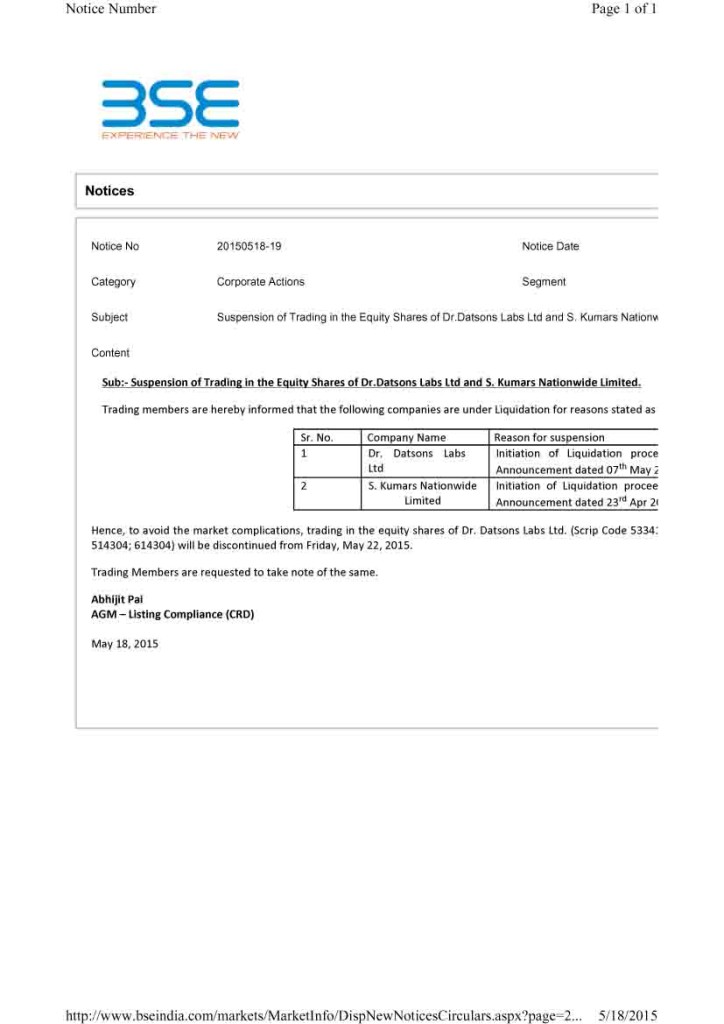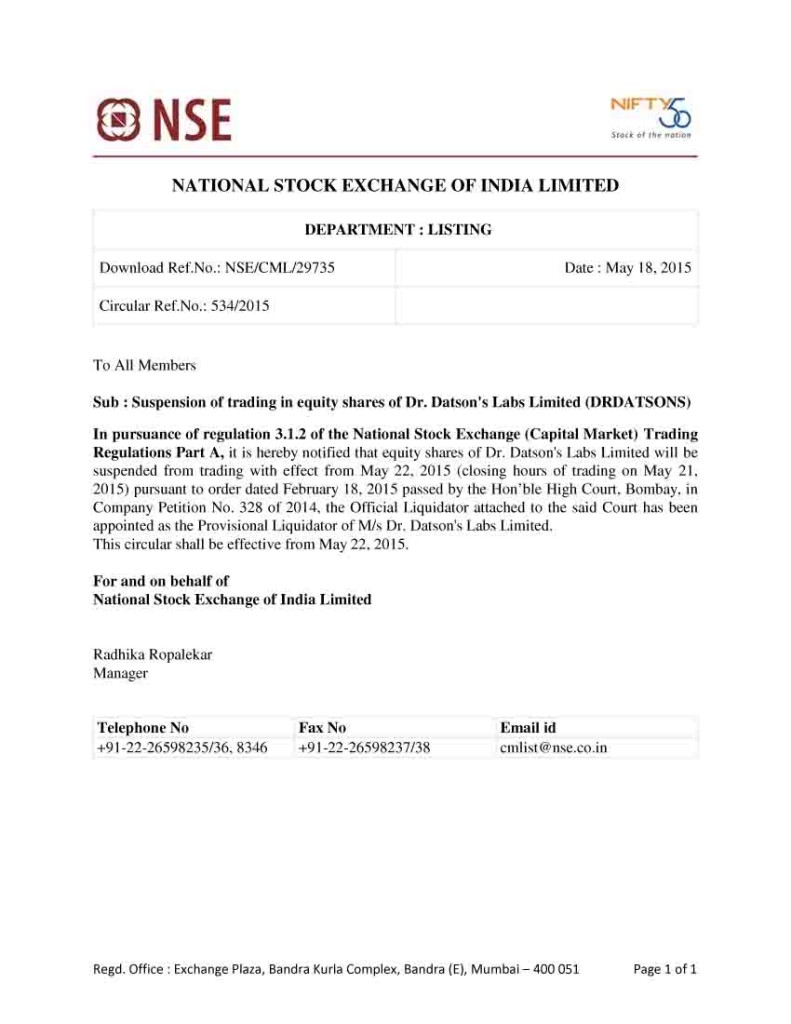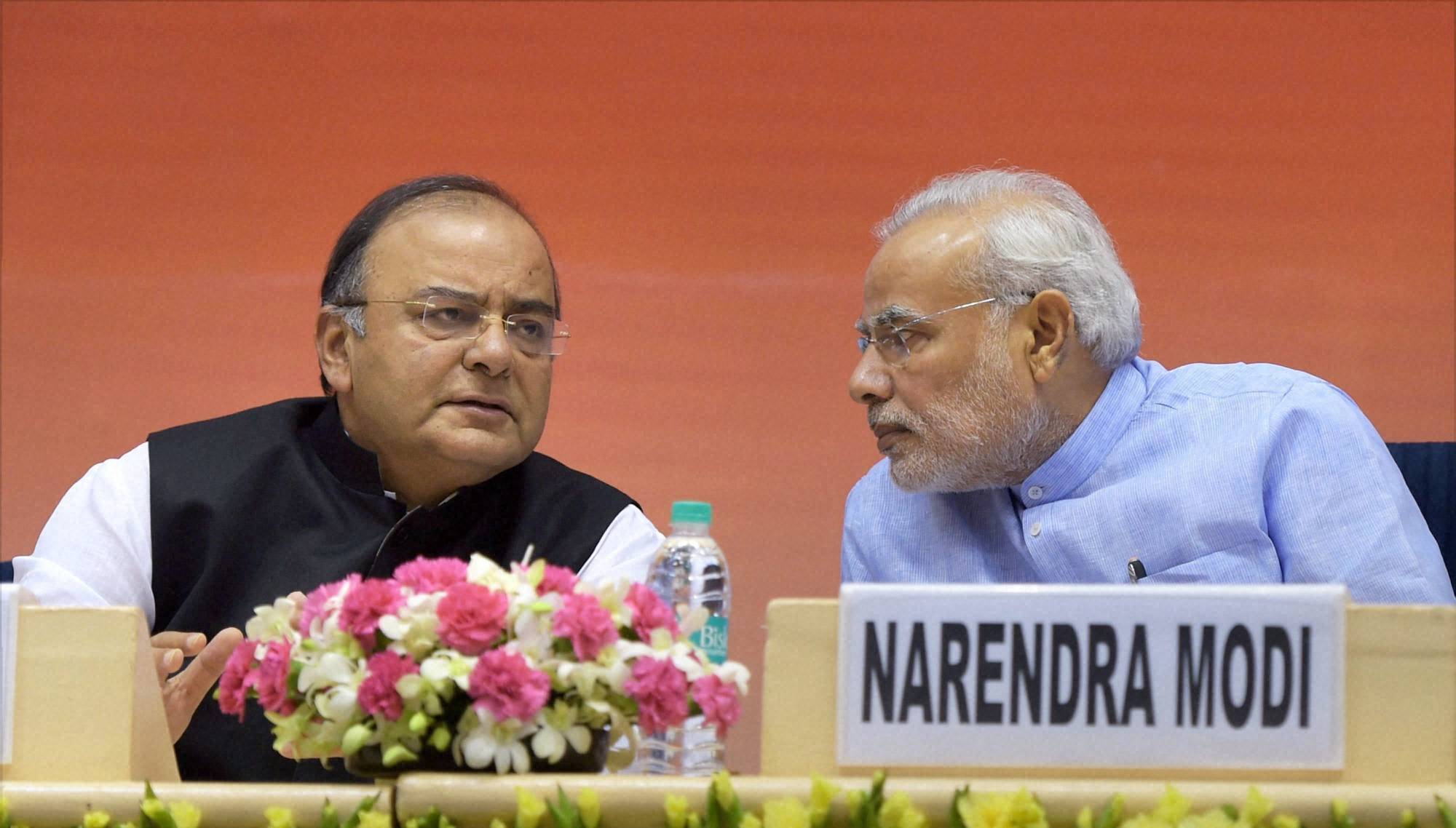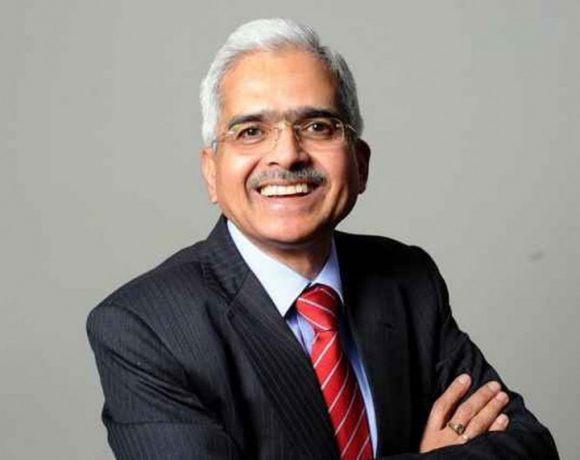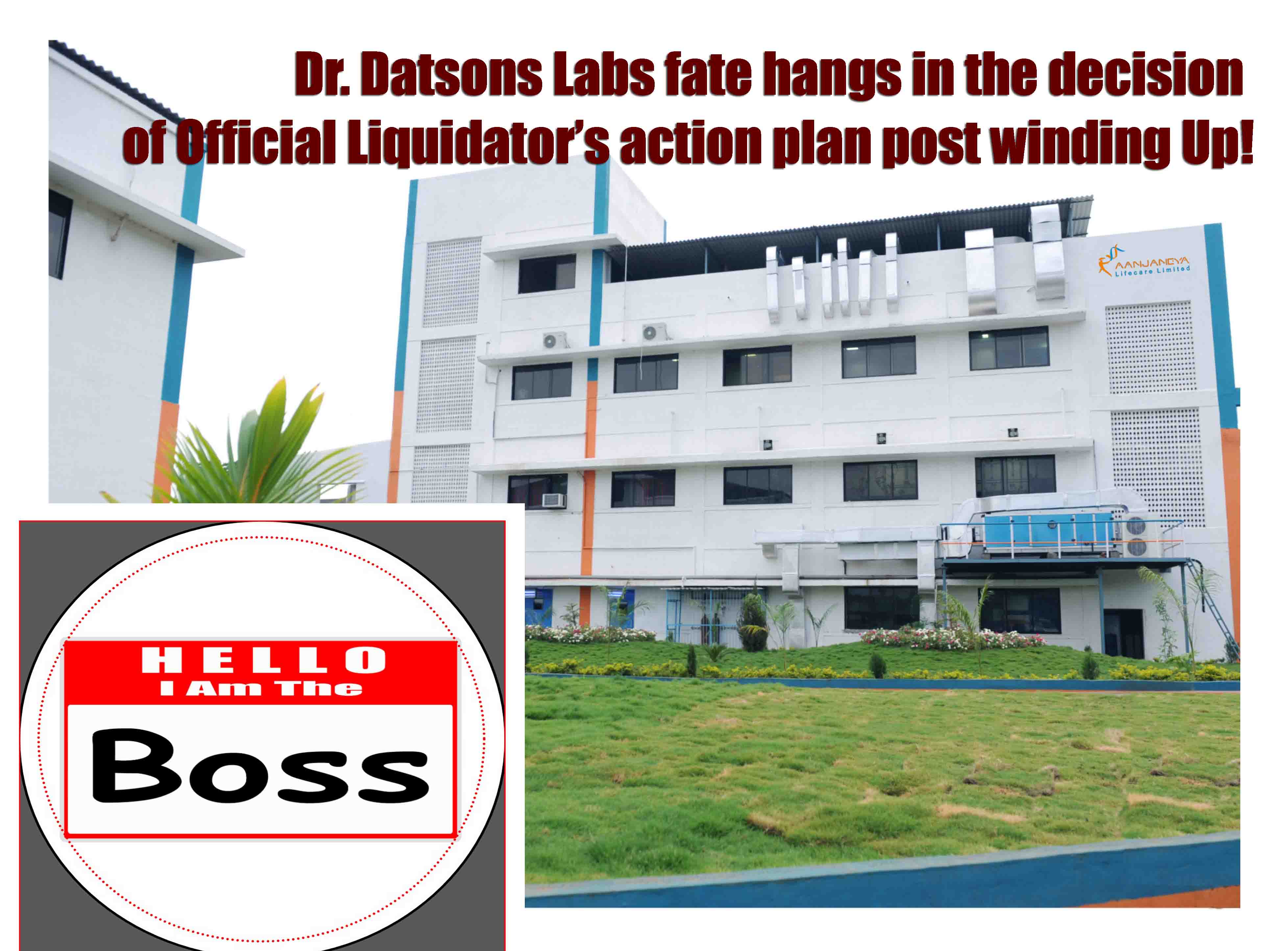

Dr. Datsons Labs fate hangs in the decision of Official Liquidator’s action plan post winding up. Anxious Retail Investors & Employees pin hope on Court Verdict of reopening of business & relisting by New Acquirer as troubled drug maker Dr. Datsons Labs Ltd faced deep in Financial Crisis, lands Official Liquidator’s Court
Debashish Mishra*
Associate Editor – Pharmaleaders
debashish.mishra@network7mediagroup.com
Dr. Datsons Lab Ltd, formerly known as Aanjaneya Lifecare Ltd, specializing in manufacturing of bulk drugs & Contract manufacturing of key drugs & formulations is facing the new phase of its life as the old order of Management & control ended with the company informing the Exchange that the creditors of the Company was gearing towards winding up petitions, vide its order dated February 18, 2015 (uploaded on website on March 27, 2015), had also appointed the official liquidator to attach to the Bombay High Court as the provisional liquidator of Dr. Datsons Labs Limited (the Company ) and directed the provisional liquidator to forthwith take charge/possession of the Company s assets, properties, stock in trade, books of account, bank account and all other assets of the Company. Pursuant to the aforesaid order, on April 30, 2015, the Official Liquidator took possession of the registered office of the Company along with moveable’s lying therein. It may also be recalled that the trading of the shares came to an end till further notice & announcement of the Official Liquidator who is in-charge of taking all decisions.
The Background
Unable to pay the debts as well as pressure to raise working capitals to execute recent orders, Dr. Datsons Labs Management landed in big trouble. The High Court had ordered that Dr. Datsons Labs Ltd deserves to be wound up and Official Liquidator to take charge. However, small depositors are still finding it difficult to get their hard-earned money as the process is sub-judice & Company is not able to make any announcement as it will be termed as contempt of court . Many companies in the past , such as Micro Technologies, Yash Birla group – Zenith Birla (India) Ltd and Birla Power Solutions, Plethico Pharma and Ind Swift had faced the similar situations as they defaulted & delayed the payment of interest and principal on their fixed deposits (FDs). Pharmaleaders has written about these companies extensively in the past. Network 7 Media Group after receiving several complaints from depositors of Dr. Datsons Labs and decided to Investigate the Company & was given to understand that it sought capital from various sources, defaulted on almost all payments to not only to banks, but big lenders as well. Finally, it was ordered that Bombay High Court to be appointed as the Official Liquidator to take charge of the assets, properties and records of Micro Technologies and repay the lenders.
The Crucial Factors
The Management prior to the court order had initiated several actions to restructure & restrategize the business operations & had appointed professionals to run the company & most importantly, the company had bagged some of the big orders both domestic as well as exports such as Eubage, Ochoa Labs, Almugdha Pharma etc. The understanding with these companies was that of executing the orders with the specified requirements. Pharmaleaders learnt from its top sources that the Company’s senior professionals requested the financial organizations & hectic negotiations was on with banks to lend money so that Dr. Datsons can start working with the orders as it had the expertise & manpower & technology but the negotiations did not materlize to arrange for the working capitals. Without working capital, it is impossible to execute these orders as the parties though placed the orders did not offer any advance amount.
Present Status
Now it appears that till the new investors take charge from the official liquidators, these orders will be of no value, however there are reasons to believe that given such a lucrative proposals & two state-of-the-art facility in Pune & Mahad, it is expected that the company may see a lease of life & the shares may again start trading after the regulators are satisfied with the explanations for relisting. Pharmaleaders tried to reach the Management for any news post the court verdict, it could not get a reply except an announcement via email from the Corporate Communications Department.“Further to your Query, the management of Dr Datsons Labs Ltd have been instructed by Hon. Curt to assist the Official Liquidators office to prepare the detailed report on functioning of the company and present it to the Hon Court. Currently the management cannot give out concrete plans as matter is sub-judice and we need instructions from Official Liquidators office on way forward. All Shareholders will receive communication from Official Liquidators office as they will be sending detailed communication to stock exchanges soon” – Corporate Communications Department
Lets have a look at the role of the Official Liquidator as mentioned in the company law.
Main Functions of Official Liquidator:
- Realization
- Settlement
- Distribution
- Dissolution
- Public Interest Reports under Section 394A
Report on private conducting of winding up proceedings by voluntarily liquidator under Sections 497 and 509
The Official Liquidator is appointed by the Central Government under section 448 of the Companies Act, 1956 attached to High Court of the State for the purpose of conducting liquidation proceedings of those companies which are ordered to be wound up by the High Court. Functionally the Official Liquidator is under the supervision and control of the High Court but administratively is under the control of the Central Government through the Regional Director.The Primary function of the Official liquidator is to administrate the assets of companies under liquidation, sale of the assets and realization of all debts of companies in liquidation for the purpose of distributing the same among the various creditors and other shareholders of the companies and to finally dissolve such companies after the affairs are completely concluded. When a company is put to winding up by an order of the High Court, the Official Liquidator attached to the said High Court takes possession of the company’s assets, books of accounts, etc. and liquidates the company as per the further orders of the High Court. The procedure of liquidation is prescribed under the Companies (Court) Rules, 1959. These rules are approved by the Honorable Supreme Court of India and notified by the Central Government. The duties and powers of the Official Liquidator as laid down in section 457 of the Companies Act, 1956 are mainly of, filing of claims against, the debtors for realization of the debts due to the company, sale of movable and immovable assets of the company taken possession by the Official Liquidator, institute criminal complaints and misfeasance proceedings against the former Directors of the company for their acts and omissions, breach of trust etc., invitation of claims from the creditors, adjudication of claims and settlement of list of creditors, payment to creditors by way of dividend and settlement of list of contributories wherever necessary, and payment of return of capital where the company’s assets exceeded its liability and finally dissolve the company under section 481 of the Companies Act,1956.
- POWERS AND DUTIES OF OFFICERS AND EMPLOYEES.
The Officers and employees are performing the duties as prescribed in the Companies Act, 1956 and the Companies (Court) Rules, 1959 subject to the supervision, control and orders of the High Court of Delhi. The duties are assigned to the officers and employees by the Official Liquidator to take possession of the assets and liabilities of the properties of the companies in liquidation. Arrange for sale of the properties and other duties as mentioned in Para 1 above. The Official Liquidator passes appropriate orders regarding the duties of officers and employees working under him.
- OFFICIAL LIQUIDATOR
In exercise of the powers conferred by Section 552 and clause (b) of the proviso to section 647, read with subsection (1) of section 642 of the Companies Act, 1956, the Central Government has framed the Companies (Official Liquidator’s Accounts) Rules, 1965.The Official Liquidators are officers appointed by the Central Government under Section 448 of the Companies act and are attached to the various High Courts. The Official Liquidators are under the administrative charge of the respective Regional Directors who supervise their functioning. In the conduct of the winding up of the companies, however, Official Liquidators act under the directions of the High Courts. The Primary function of the Official liquidator is to administer the assets of companies under liquidation, sale of the assets and realization of all debts of companies in liquidation for the purpose of distributing the same among the various creditors and other shareholders of the companies and to finally dissolve such companies after the affairs are completely concluded. When a company is put to winding up by an order of the High Court, the Official Liquidator attached to the said High Court takes possession of the company’s assets, books of accounts, etc. and liquidates the company as per the further orders of the High Court. The procedure of liquidation is prescribed under the Companies (Court) Rules, 1959. These rules are approved by the Honourable Supreme Court of India and notified by the Central Government.
- WHO CAN BE APPOINTED AS OFFICIAL LIQUIDATOR?
A member from the panel of the professional firms of chartered accountants, advocates, company secretaries, cost and work accountants which the central government may constitute. Body corporate approved by central government. Whole-time or part-time officer appointed by the central government.
- ROLE OF OFFICIAL LIQUIDATOR
The role of official liquidator has been well discussed in various provisions in the Companies Act 1956 and the Companies (Official Liquidator’s Accounts) Rules, 1965. Sections 448 to 463 of the Companies Act 1956 deals with the overall role of official liquidators in winding up proceedings. Let’s have a sneak view of the provisions relating to liquidators:
SECTION: MATTERS DEALING UNDER THE SAID SECTIONS
- 448 APPOINTMENT OF OFFICIAL LIQUIDATOR
- 449 OFFICIAL LIQUIDATOR TO BE LIQUIDATOR
- 450 APPOINTMENT AND POWERS OF PROVISIONAL LIQUIDATOR
- 451 GENERAL PROVISIONS AS TO LIQUIDATORS
- 452 STYLE ETC OF LIQUIDATOR
- 453 RECEIVER NOT TO BE APPOINTED OF ASSETS WITH LIQUIDATOR
- 454 STATEMENT OF AFFAIRS TO BE MADE TO OFFICIAL LIQUIDATOR
- 455 REPORT BY OFFICIAL LIQUIDATOR
- 456 CUSTODY OF COMPANY’S PROPERTY
- 457 POWERS OF LIQUIDATOR
- 458 DISCRETION OF LIQUIDATOR
- 458A EXCLUSION OF CERTAIN TIME IN COMPUTING PERIODS OF LIMITATION
- 459 PROVISION FOR LEGAL ASSISTANCE TO LIQUIDATOR
- 460 EXERCISE AND CONTROL OF LIQUIDATOR’S POWERS
- 461 BOOKS TO BE KEPT BY LIQUIDATOR
- 462 AUDIT OF LIQUIDATOR’S ACCOUNTS
- 463 CONTROL OF CENTRAL GOVERNMENT OVER LIQUIDATORS.
…………………………………………………………………………………………………..
- As per the Companies (Official Liquidator’s Accounts) Rules, 1965, the liquidator has to comply with the following:
- The Official Liquidator shall maintain in his office separate account in respect of each company under his charge.
- The Official Liquidator shall also maintain a Central Cash Book to record all cash transactions; such other books as may be necessary to work out the periodical reconciliation of the balances in the official liquidators’ account.
- Every Official Liquidator shall, with the approval of the Central Government, open a personal ledger account at the nearest branch or agency of the Reserve Bank to be called the “Official Liquidator’s Account” which shall be a combined account in respect of all the companies under his charge.
- Payments made in cash and those made by cheque shall be remitted to the Reserve Bank under separate challans.
- The acknowledgment of the Reserve Bank shall be obtained for all moneys remitted into the Reserve Bank to the credit of the said account.
- The Official Liquidator shall, at the end of every three months, examine the account of each company in his charge to ascertain what moneys are available for investment and record in the record book of the company the fact of his having examined the accounts, the decision taken by him regarding the investment, and in case he decides not to invest any surplus fund, the reasons for such decisions.
POWERS OF LIQUIDATOR IN WINDING UP:
- In compulsory winding up of a company:
- As per section 457(1) of The Companies Act 1956, the liquidator has the following powers with the sanction of court:
- to institute and defend any suit, prosecution or other legal proceeding, civil or criminal, in the name and on behalf of the company;
- to carry on the business of the company;
- to sell the immovable and movable property and actionable claims of the company by public auction or private contract;
- to raise on the security of assets of the company any money requisite;
- to do all such acts necessary for winding up the affairs of the company and distributing its assets.
- As per section 457(2) of The Companies act 1956, the liquidator has the following powers without obtaining the sanction of court:
- to do all acts and to execute all deeds, receipts and documents in the name and on behalf of company and to use common seal of the company for that purpose;
- to inspect the records and returns of company;
- to prove, rank and claim in the insolvency of any company;
- to draw, accept, make and endorse any negotiable instruments in the name and on behalf of the company;
- to appoint an agent to do any business which the liquidator is unable to do himself.
- In winding up subject to the supervision of court.
- As per section 546 of The Companies Act 1956, the liquidator has the following powers with the sanction of court:
- to pay any classes of creditors in full;
- to make any compromise or arrangement with the creditors to have any claim ascertained;
- to compromise any call, debt or liability.
- In voluntary winding up of company
Voluntary liquidator may exercise the following powers with the sanction of special resolution in the case of members’ voluntary winding up; with the sanction of court or committee of inspection in the case of creditors’ voluntary winding up; with the sanction of creditors if there is no such committee:
- to institute and defend any suit, prosecution or other legal proceeding, civil or criminal, in the name and on behalf of the company;
- to carry on the business of the company;
- to sell the immovable and movable property and actionable claims of the company by public auction or private contract;
- to raise on the security of assets of the company any money requisite.
- The following powers can be exercised by him without any sanction:
- to do all acts and to execute all deeds ,receipts and documents in the name and on behalf of company and to use common seal of the company for that purpose;
- to inspect the records and returns of company;
- to prove, rank and claim in the insolvency of any company;
- to draw, accept, make and endorse any negotiable instruments in the name and on behalf of the company;
- to appoint an agent to do any business which the liquidator is unable to do himself;
- to exercise the power of court of settling the list of contributories;
- to exercise the power of court of making calls;
- to pay debts of company and adjust the rights of contributories among themselves.
DUTIES OF THE OFFICIAL LIQUIDATOR
- Investigation
Where a winding-up order is made by the court the official receiver has a statutory duty to investigate–
- a) If the company has failed, the causes of the failure; and
- b) Generally, the promotion, formation, business, dealings and affairs of the company. This applies to all cases including those where an insolvency practitioner is appointed liquidator by the court immediately on the making of the winding-up order.
The official receiver may make a report to the court if he/she thinks fit, though this is carried out rarely.
- Official receiver as liquidator
The official receiver becomes liquidator immediately the winding-up order is made and will remain so until someone else becomes liquidator. He/she also becomes liquidator during any subsequent vacancy. The official receiver has a duty to protect the company’s assets and, where appropriate, to take into custody or under his/her control all property, etc. to which the company is or appears to be entitled, to realise and distribute the same to the company’s creditors and, if there is a surplus, to the persons entitled to it.
- Realisation of assets at the initial stage
There is no reason why the official receiver should not use his/her powers as liquidator to commence the realisation of assets, where the assets involved are easy to realise and, particularly, where an asset may be rendered valueless by the date of the first meeting, such as bulky items of stock which are expensive to store or small value bank balances held in accounts that incur charges. Even if the early realisation of an asset were to prejudice the appointment of an insolvency practitioner, the official receiver should act in the best interests of creditors and seek realisation.
- Statement of affairs
The official liquidator must decide whether to require a statement of affairs. It is not usually the case that a statement of affairs will be required before the first interview with the director(s) and generally the information supplied in form PIQC relating to assets and liabilities will be used rather than a separate statement of affairs being required.If the company has been subject to earlier insolvency proceedings a statement of affairs may have been prepared in relation to those proceedings.Reference should also be made to the chapter pertaining to– Statements of affairs.
- Case files
The official liquidator is required to maintain a case file in respect of each winding up. The file is divided into ten parts and papers are filed within those parts as follows:
- Preliminary examination papers
- Further investigation
- Court papers
- Statutory notices
- Correspondence
- Meetings, reports to creditors, notices and proofs
- Assets
- Closing/IP handover
- Miscellaneous
- Confidentiality
The official liquidator must not disclose information about a case to any person who does not have a legitimate reason to have the details of the case.
- Insolvency Practitioner appointed liquidator immediately
Where a winding – up order is made immediately upon the appointment of an administrator ceasing to have effect, or where there is a supervisor of a voluntary arrangement in office, the court may appoint the former administrator or supervisor as liquidator of the company.In such circumstances, the official liquidator remains under a statutory duty to investigate, to give notice of, advertise and gazette the order and to provide information to creditors and contributories. Any inspection of the company’s books and papers will need to be made with the arrangement of the liquidator – possibly, by inspecting the records at their offices. The liquidator has a duty to co-operate with the official receiver’s investigations, including making company records available.The official liquidator does not have to summon meetings of creditors and contributories or issue notice of no meeting. Where a liquidator is appointed by the court in the circumstances mentioned, it is the liquidator’s duty to send forms of proof of debt. A proof of debt must be sent to any creditor of the company on request.The official liquidator may encounter the involvement of insolvency practitioners in respect of other insolvency proceedings involving the company.
…………………………………………………………………………………………………………………………..

